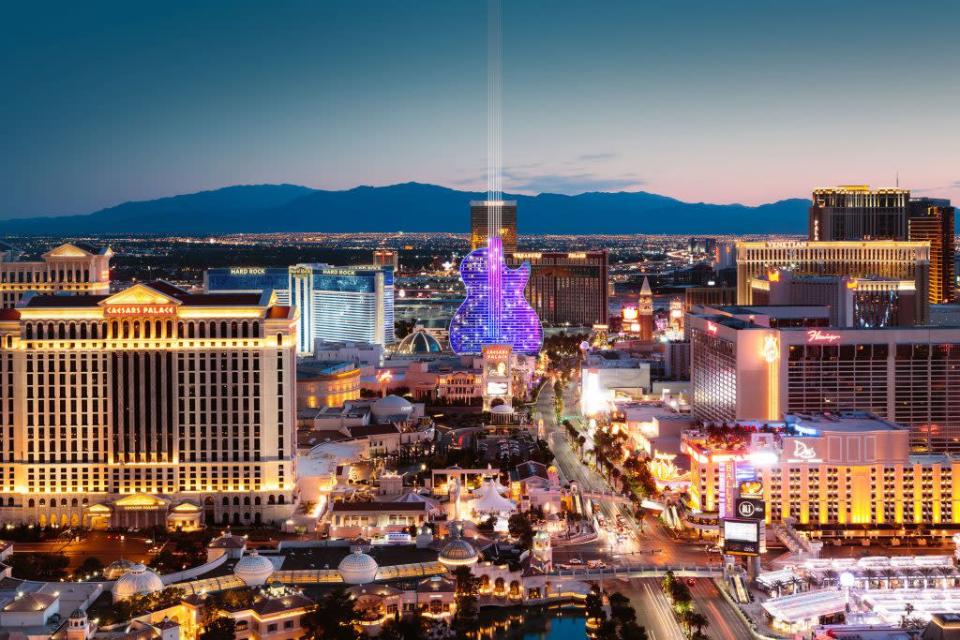MGM Resorts Is Selling the Mirage to Hard Rock for $1.1 Billion

MGM Resorts is selling The Mirage Hotel and Casino to Hard Rock International for $1.075 billion in cash.
The hospitality and entertainment brand said Monday night that it will enter into a long-term lease agreement with VICI Properties Inc. for the real estate property of the hotel. MGM Resorts CEO William Hornbuckle revealed during the company’s third quarter earnings call early last month that a sales exploration for The Mirage, one of the long-time staples of the company’s Las Vegas Strip portfolio, was underway.
Hard Rock plans to build an iconic guitar-shaped hotel on the property while rebranding the original Mirage hotel tower.
“This transaction is a significant milestone for MGM Resorts, and for Las Vegas,” Hornbuckle said in a statement. “As part of the team that opened The Mirage in 1989, I know firsthand how special it is, and what a great opportunity it presents to the Hard Rock team.”
The sales follows Las Vegas Sands’ move earlier this year to sell its Venetian Resort Las Vegas and the Sands Expo and Convention Center. The $6.25 billion deal was split between Apollo Global Management buying the operating company of the Venetian for $2.25 billion and VICI Properties buying the land and real estate assets of the Venetian for $4.0 billion.
VICI will similarly buy the real estate assets in the Hard Rock-MGM Resorts transaction at The Mirage. MGM will retain the rights to The Mirage branding and license it out to Hard Rock for as long as three years while the rebranding and redevelopment gets underway. The acquisition is expected to close in the second half of next year.
The Mirage first opened in 1989 and ushered in the era of mega-resorts on the Las Vegas Strip catering to heightened entertainment options. MGM Resorts bought The Mirage in 2000 as part of the more than $4 billion Mirage Resorts acquisition from former casino developer Steve Wynn. That portfolio also included the nearby Bellagio and Treasure Bay resorts.
The Mirage was for years the home of Siegfried Fischbacher and Roy Horn — known on stage as Siegfried & Roy, the late German-American duo of entertainers and magicians popular for their performances with white lions and tigers. The show became one of the most attended in Las Vegas but was eventually cancelled after Horn was attacked by a tiger during a show in 2003.
The resort’s sale is the latest in a flurry of deals that increasingly puts MGM Resorts out of the business of owning real estate in Las Vegas and instead focus on operations and online gaming.
MGM Resorts executed a string of sale-leaseback deals in recent years with Blackstone where the investment firm takes over ownership of the real estate while the gaming company maintains management rights. Some of those deals included many of MGM’s best-known assets in Sin City like The Bellagio, MGM Grand, and CityCenter — home to the Aria Resort & Casino and Vdara Hotel and Spa.
It has also scooped up newer operations agreements in the high-end gaming sector, announcing plans in September to acquire the operations at the Cosmopolitan of Las Vegas for $1.6 billion as part of Blackstone’s $5.65 billion sale of that resort.
MGM Resorts increasingly sees online gaming and sports betting as an extension to its physical casino floors attached to resorts around the world. A third quarter investor presentation showed the company expects to win as much as a quarter of the U.S. online gaming market share.
“We know that an omnichannel customer is worth more than a single-channel customer,” Hornbuckle said last month.
Selling off real estate helps MGM Resorts expand beyond its Las Vegas assets and into more of a customer base who would rather gamble from their own home than take a trip to Nevada.
“This announcement marks the culmination of a series of transformational transactions for MGM Resorts during the last several years,” Paul Salem, chairman of the board of directors at MGM Resorts International, said in a statement. “The monetization of our entire real property portfolio, together with the addition of CityCenter and our agreement to acquire The Cosmopolitan of Las Vegas, will position the Company with a fortress balance sheet, premier portfolio, and significant financial resources to pursue our strategic objectives.”
[UPDATE]: This story was updated after publication with more context of MGM Resorts and its prior deals in Las Vegas.
Subscribe to Skift newsletters for essential news about the business of travel.



